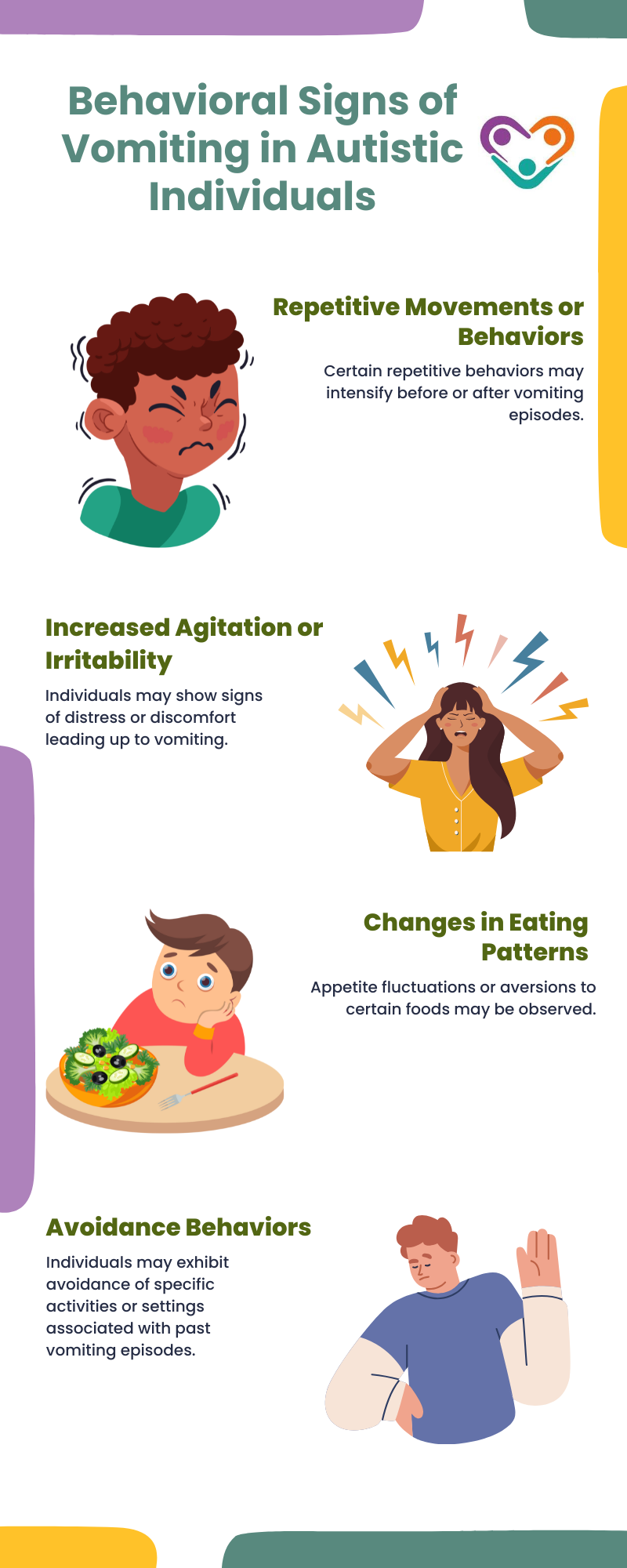Vomiting can be an unsettling experience, especially when it occurs frequently or unexpectedly. For individuals with autism, this seemingly straightforward issue may take on a unique dimension, linked to sensory sensitivities, dietary challenges, or underlying medical conditions.
Understanding these connections is key to providing effective support and easing discomfort. By exploring the ties between vomiting and autism, we can uncover insights that may improve the health and well-being of those affected.
Causes and Triggers
While examining the relationship between autism and vomiting, we have to consider the various causes and triggers that may contribute to this comorbidity. Sensory sensitivities, anxiety and stress triggers, as well as gastrointestinal issues, play significant roles in understanding why individuals with autism may experience vomiting.

Sensory Sensitivities
Individuals on the autism spectrum often have heightened sensory sensitivities, which can manifest in response to certain stimuli such as strong smells, loud noises, or particular textures.
These sensory sensitivities can trigger a stress response in the individual, leading to discomfort and potential vomiting episodes.
Anxiety and Stress Triggers
Anxiety and stress are common challenges faced by individuals with autism or AuDHD (Autism and ADHD). Changes in routine, social interactions, or overwhelming environments can trigger feelings of anxiety and stress in individuals on the spectrum. These emotional responses can sometimes manifest physically, resulting in symptoms like nausea and vomiting.
Gastrointestinal Issues
Gastrointestinal issues are frequently reported among individuals with autism. Problems such as constipation, acid reflux, or irritable bowel syndrome (IBS) can contribute to gastrointestinal discomfort, leading to episodes of vomiting. It’s crucial to address and manage these gastrointestinal issues to alleviate the burden they place on individuals with autism.
Understanding the interplay between sensory sensitivities, anxiety and stress triggers, as well as gastrointestinal issues can provide valuable insights into the underlying reasons for vomiting in individuals with autism.
Signs and Symptoms
Individuals with autism who experience vomiting may exhibit various signs and symptoms that can be categorized into behavioral indicators, medical symptoms, and communication challenges.
Behavioral indicators of vomiting in individuals with autism can vary depending on the underlying cause and triggers. Some common behavioral signs to look out for include:

Aside from behavioral manifestations, individuals with autism may also display specific medical symptoms related to vomiting. These symptoms can include:
- Complaints of stomach pain, bloating, or discomfort before vomiting.
- Irregular bowel movements or digestive issues may accompany vomiting episodes.
- Excessive drooling or hypersalivation can be a precursor to vomiting.
- Sweating, pallor, or other physical signs of distress may be present.
Communication challenges can further complicate the identification and management of vomiting in individuals with autism. These challenges may manifest as:
- Difficulty expressing discomfort
- Limited verbal communication
- Sensory overload
- Lack of response to inquiries
Recognizing and understanding the behavioral, medical, and communication aspects of vomiting in autism can help caregivers and healthcare providers better address the needs of individuals with autism who experience this comorbidity.
Diagnosis and Treatment
Understanding the diagnosis and treatment options for vomiting is essential for providing appropriate care. Let’s look at some key aspects of managing vomiting in individuals with autism.

Seeking Professional Evaluation
While confronted with vomiting episodes in individuals with autism, seeking a thorough professional evaluation is critical. Consulting healthcare providers, including pediatricians, gastroenterologists, or developmental specialists, can help identify any underlying medical conditions or triggers contributing to the vomiting episodes.
The evaluation process may involve:
- Comprehensive medical history assessment.
- Physical examination to rule out any physical illnesses.
- Diagnostic tests such as blood work, imaging studies, or gastrointestinal evaluations to uncover any gastrointestinal issues.
Early detection and diagnosis through professional evaluation can guide appropriate interventions and management strategies tailored to the individual’s specific needs.
Medical Interventions
Medical interventions play a significant role in the treatment of vomiting in individuals with autism. Depending on the underlying cause and severity of the vomiting episodes, healthcare providers may recommend various medical treatments. These interventions can include antiemetic medications, gastrointestinal medications, and nutritional supplements.
It is crucial to follow the healthcare provider’s recommendations closely and monitor the individual’s response to medical interventions to optimize treatment outcomes.

Behavioral and Therapeutic Approaches
In addition to medical interventions, behavioral and therapeutic approaches are integral components of managing vomiting in individuals with autism. These approaches focus on addressing the behavioral aspects and underlying triggers associated with vomiting episodes. Behavioral and therapeutic strategies may include:
- Applied Behavior Analysis (ABA) therapy techniques to modify behaviors related to vomiting.
- Cognitive-behavioral therapy to address anxiety and stress triggers contributing to vomiting.
- Sensory integration therapy to manage sensory sensitivities that may lead to vomiting episodes.
As research on the correlation between vomiting and autism continues to evolve, ongoing studies shed light on the intricate relationship between these two aspects.
Additionally, exploring potential areas for enhancement in comprehending and managing vomiting in autism opens doors for improved care and support for individuals on the spectrum.
At Golden Care Therapy, we provide expert ABA therapy tailored to meet individual needs. Our highly skilled ABA therapists in Indiana, New Jersey, New York, Georgia, and Florida are committed to delivering compassionate, evidence-based support designed to help clients thrive. Reach out to us today to learn more about our services and schedule a consultation.
Sources:



